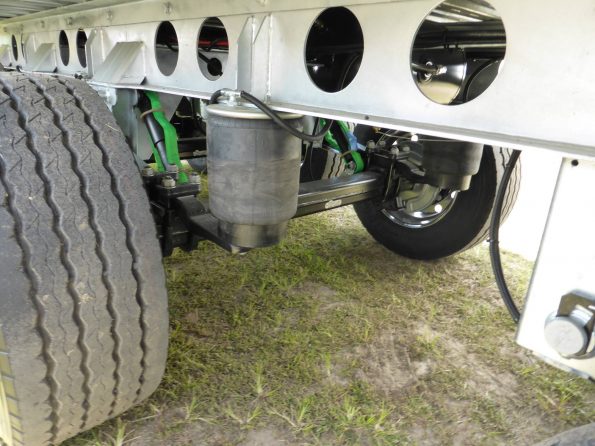Air suspension has some significant advantages over traditional coil or leaf spring suspension on trucks and trailers. It is a system of rubber and polyurethane bags, inflated by a compressor, which substitute for coil or leaf spring suspension.

Air suspension on a trailer unit showing the air lines from the compressor leading into the air spring (the black unit).
Benefits
Driver comfort
Drivers that spend a long time in the cab are exposed to ‘NVH’ (noise, vibration and harshness). These can cause fatigue, a bad back, hearing loss (if the truck is very loud) and more. Fatigue is a big killer, so anything that reduces the chances of a driver falling asleep at the wheel is a good thing. Making the truck more comfortable also means less time off work with aches and pains.
Drivers report that trucks with air suspension glide over bumps much more easily and give increased handling confidence. The driver can also choose whether they want a softer ride for motorway cruising or a harder ride for better handling and less body roll on more challenging roads.
In short-wheelbase trucks, the tendency to bounce on bumpy roads when empty is reduced as there’s more control in the softness of the suspension.
Less wear and tear
Air suspension means less vibration through the vehicle and that means less wear and tear on components on the truck or trailer. Tyre wear is improved due to smoother suspension characteristics, and some systems can lift axles that aren’t needed, prolonging tyre life.
Better efficiency
Better suspension means better cornering speeds and that leads to savings in travel time.
The ride height can be optimised based on the speed, type of surface and whether the truck is laden or empty. Usually an unladen truck will be taller than a laden truck because the suspension isn’t compressed, but with air suspension, the ride height can be lowered. Travelling with a lower ride height means better aerodynamics (i.e. reduced wind resistance) and cornering performance.
Load versatility
Air suspension can automatically level the suspension when loads are unevenly distributed, giving better braking and axle loads.
As the height can be adjusted, the truck or trailer can ‘kneel’ to help with loading, or it can be raised to clear obstacles.
Fragile loads suffer less damage when air suspension is used. This is desirable with loads such as glass or antiques.
Environmental benefits
Less vibration is transmitted through the surface over the road meaning that the road surface (which also includes bridges and other structures attached to the road) don’t degrade as quickly. This means that roads don’t have to be repaired as frequently; repairs lead to traffic congestion plus the associated machinery and materials to effect the repair, all of which cause pollution.
Fuel economy improvements mean less pollution into the atmosphere.
Better load flexibility means the truck can be used for more applications and is less likely to be running empty, which is a waste of fuel.
Resale values
Resale values are better on trucks and trailers with air suspension.
Disadvantages
Air suspension is more expensive to fit and it does require more maintenance than regular leaf spring suspension.
Drivers need to know how to get the most out of it by using the settings correctly.
For some applications, air suspension makes little or no difference.
Air suspension weighs more than leaf suspension, and this can cancel out other fuel economy benefits if the type of driving isn’t that dependent on aerodynamic gains.
